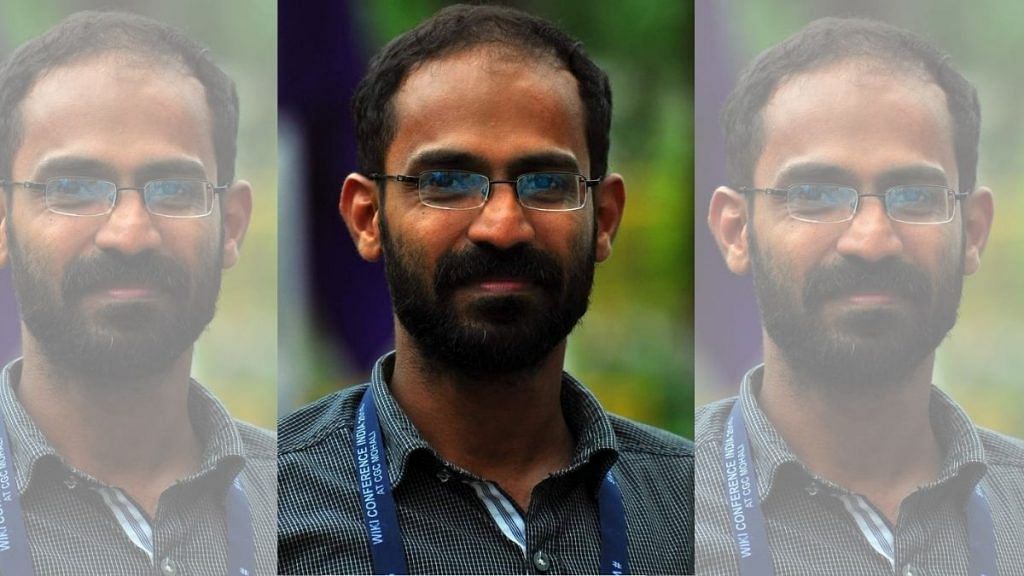New Delhi: Siddique Kappan had no work in Hathras and, therefore, his “sojourn with persons (in Hathras) who do not belong to the media fraternity is a crucial circumstance going against him”, the Allahabad High Court said as it denied bail to the Kerala-based journalist.
Kappan and three others were arrested on 5 October 2020 by Uttar Pradesh Police when they were on their way to Hathras.
Kappan claims he was going to cover the alleged gang rape and subsequent murder of a Dalit teenager when he was intercepted by a police team and taken into custody.
But the Lucknow bench of the Allahabad High Court — taking note of the police chargesheet in the case — said: “The defence taken by the applicant that he is a journalist and only owing to his professional duty, he wanted to visit the place of Hathras incident stands nullified by the averments in the chargesheet and the persons he was arrested with while travelling in a car.”
The judge, Justice Krishan Pahal, further said that the prosecution’s allegations of tainted money being used by the applicant and his colleagues for inciting violence cannot be ruled out.
Kappan had approached the high court to appeal the order of a trial court, which had rejected his bail plea in July 2021.
Accusing Kappan and the others of creating communal disharmony, the police have invoked various sections of the Indian Penal Code (IPC) as well as the anti-terror Unlawful Activities (Prevention) Act or UAPA.
These charges have been invoked against them on the basis of pamphlets allegedly seized from their possession that read: “AM I NOT INDIAS DAUGHTER MADE WITH Carrd”.
The prosecution claimed Kappan collected funds to run a website “Carrd.co” that had a dossier to impart training on how to conceal one’s identity during demonstrations and “ways to incite violence”. Kappan is also accused of being associated with the Popular Front of India (PFI) and carrying out illegal activities at the Islamic outfit’s behest.
Also Read: MP man’s plea to free ‘wife’ from shelter lands him in dock as HC probes marriage, her ‘conversion’
Arguments made in court
Arguing before the high court, Kappan’s counsel denied the allegations of him inciting violence or spreading communal disharmony through his writings, but admitted that the journalist was working with a weekly newspaper associated with the PFI.
It was only because of his job that he was in touch with PFI members, Kappan’s lawyer said, denying his involvement with the organisation’s activities.
As for some Islamic literature found from his car, Kappan’s lawyer said it belonged to the journalist’s friend who was writing a book on former leaders of SIMI (Students’ Islamic Movement of India) — a banned extremist organisation.
Kappan claimed he was helping out his friend by interviewing some of such leaders who now are with the “Trinamool Congress (TMC)”.
The counsel for the UP Police, however, stuck to the charges.
Kappan’s bail, the counsel argued, was opposed on the grounds that being a resident of Kerala, he had nothing to do with the incident in Hathras and had deliberately, “with mala fide intention”, travelled to UP along with the co-accused.
He (Kappan) was a recipient of illegal funds and, along with “terrorists”, had planned to spread social disharmony and incite a class war, the counsel for UP Police submitted.
Accepting the submission, Justice Pahal observed in the order that the state machinery was already on tenterhooks owing to the tension prevailing in the state due to various types of information being circulated across all forums of media, including the internet.
The UAPA was found to be applicable in the case since the legislation was enacted to control instances of use of tainted money, as is alleged in Kappan’s case.
Noting that the UAPA prohibits grant of bail unless it is proven there is no prima facie case against the accused, and that the Supreme Court upheld this provision in 2019, the judge perused the chargesheet in the case to establish the same.
A perusal of the document reveals Kappan prima facie committed the crime, Justice Pahal said.
(Edited by Amrtansh Arora)
Also Read: Missing files, quick bail: Yogi govt panel claims gangster Vikas Dubey got ‘state patronage’
